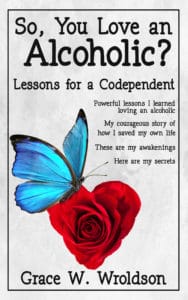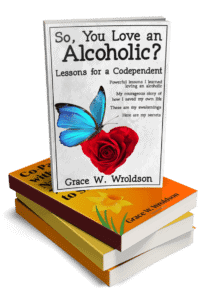“I love an alcoholic! Now, what do I do?”
My readers frequently ask me this question. We love an alcoholic. Now, we want to know just what to do about it.
The thing is, I can’t tell someone what to do to make a struggling alcoholic sober (just like we can’t make someone happy, single-handedly pull someone out of a deep depression, or change a traumatic and abusive childhood that already happened). I’ve learned that I have a limited capacity! However, I have learned to love in more effective ways. I have learned to place my love where it can last and have a positive impact. “Love placement” is key. We have choices on what to do with our love.
Learn The Lessons
What I can tell my readers is that the #1 thing they can do for themselves is to learn. Seriously, with conviction, completely learn what is needed at the moment. I encourage readers to learn from everything that’s happened. Learn from all that they have already tried. Learn about their partner and who they are by their behavior. Learn about themselves and their behaviors and reactions. We can learn from everything—one day at a time.
Listen to this Blog on PodBean!
Because when you are learning, you are able to change, grow, heal, and make better choices. Someone who doesn’t learn is doomed to repeat their past mistakes. It’s a learning disorder when someone can’t/won’t/doesn’t learn from what’s happening to them and around them. Denial is a form of a self-inflicted learning disorder—designed to help us cope. Applying a thick coat of “didn’t-see-that” denial means that you are flat out refusing to learn. It can be this stubbornness against learning our lessons that keeps us trapped. We cling to our stubbornness because we don’t want to learn, but yet, ironically, want the alcoholic to learn what’s good for them when we won’t do this ourselves. Huh!? This is our hypocrisy. When we love an alcoholic, we want them to start learning and changing, but we find ways not to do it ourselves because it would be too painful. We struggle with this basic issue—too. We aren’t ready to learn. (This means that we have a problem—too.)
Then, What Do We Do? (Be Willing)
We start by having a willingness to begin learning. Your process of learning might be repeating the same failure 100 times before you: (a) smartly give up; (b) surrender and admit defeat or powerlessness, or (c) hit a “codependent bottom.” Refusing to learn is a huge personal obstacle. It goes beyond any control/fear issues we have that wants things to go our way. We can’t “right” the entire world. It’s impossible. We can’t “fix” another person who doesn’t want to be “fixed” either. We can’t cure something we didn’t cause. (Read that again!) But, we can learn to help ourselves. (This is often the overlooked HUGE part that we play.)
You are in a learning process. If there are obstacles to your learning such as an unwillingness to face failure, aversion to processing grief, or fear of confronting severe personal injustice, you may be putting yourself at risk of never-ending unhappiness. Learning how to fail gracefully, grieve fully, and use our legal rights can remedy this gnawing pain.
There is Hope! (Start Learning Healthy Behaviors)
We can learn to be happy. We can learn to choose healthy behaviors over self-destructive ones. We can learn to respond rather than react. We can learn to focus on ourselves. We can learn to set limits and boundaries with ourselves and others. We can learn what doesn’t work and what does. We can learn that temporary fixes don’t last. We can learn to plan and prepare for our future. We can learn to face the truth about another person. We can learn to face the truth about ourselves. We can learn to be part of the solution and step out of being part of the problem.
The most important thing you can do is ask yourself: “What am I learning right now?” Then, sit with this question. Journal about it. Share it with a safe person. Solidify your lesson learned. Don’t let it escape you. When you are learning, you are growing. You have a chance at success and happiness if you can learn. When you learn, you steer clear of problems and potential trouble and steer towards health and security. Take time to deeply reflect on what you’ve learned about a person, relationship, or situation. You may not have a psychology degree to figure out what’s wrong with the alcoholic’s thinking and drinking, but you don’t need one to learn from experience. Refusing to learn our lessons can set us up for years, decades, or even a lifetime of pain from the same awful relationship.
Also, keep an open mind and learn to love people in a different way than you thought you would. You might have to learn to love from a distance. You might even have to learn to love yourself MORE! You might have to learn that love isn’t pity, and compassion can’t cure a disease. You might have to learn how tough-love can save you and possibly teach them a lesson. You can learn to treat yourself with respect, authentic love, and dignity. You can learn to let go. (If you can learn, you have a chance.) So, take your time to learn. Think about what you are learning. Get this knowledge down and turn it into wisdom. Knowledge + Experience = Wisdom (but only if you learn). We all know that working with wisdom is the way to go. (Read my blog on How to Practice Tough-Love with the Alcoholic.)
What About Them? (They Can Learn To Grow and Change, Too)
Very often, change begins with us. Guess what? The other person will have to do the same as you: learn. If they are fundamentally incapable, then we learn to outgrow relationships that don’t serve us (as painful as this is). But there’s a chance that they will be inspired to grow, too. We can’t pull someone out of a pit by going down into their darkness. We can’t sit with them at the bottom to get them out. Us going down with them just puts two people crippling in a pit of horrendous pain. If you have fallen into your own pit, learning lessons is like adding rungs to a ladder to get out. You can, by learning, take one step at a time up—towards out. That’s your hope. (And that’s what I did.) I learned and stepped into the light and out of his hole. I attained my own health and happiness. I also got the relationship of my dreams by self-partnering and broke free of my codependency. Consequently, he had to change—even though he didn’t want to. So, I ask you, what are you learning?
—Grace W. Wroldson, mother, author, survivor, and thriver with 5 books available on Amazon
Website: GraceWroldson.com
Post to me what you are learning on FB. I would love to hear from you!
Join my private FB Group!
To book a private coaching session with the author, visit her scheduler here–> LINK
To learn 25 more powerful lessons pick up my book: So, You Love an Alcoholic?: Lessons for a Codependent —available on Amazon and Audible (ACX)
For follow-up lessons to learn, buy my second book: I Loved an Alcoholic, But Hated the Drinking: 11 Essential Strategies to Survive Codependency and Live in Recovery with Self-Love
Stay in touch! Get my FREE tips, tools, and tricks—plus valuable survivor wisdom!
*SUBSCRIBE TO MY BLOG! CLICK HERE!
*GET MY NEWSLETTER! CLICK HERE!




